NASHVILLE - The co-sponsor of a Senate proposal to create a school voucher program in Tennessee said Monday that lawmakers will try again to pass the measure in the next legislative session - despite failures in the last three.
The proposal, or "opportunity scholarship," would let parents move a child from a failing public school in Tennessee to a private school with funding from the state.
Republican Sen. Brian Kelsey of Germantown told reporters on Monday following a Senate Education Committee hearing on vouchers that he's optimistic the Legislature starting in January could be the one to finally pass aschool voucher proposal.
He said one reason is that the chairman of the House Education Subcommittee where the companion bill got stuck in the last session is also a co-sponsor of the legislation he's supporting.
"I've had positive conversations with members of the House," Kelsey said. "I think the House simply needs a chance to vote on this."
Kelsey didn't discuss details of the proposal, but he said it's similar to one that passed the Senate earlier this year, and that has the support of Republican Gov. Bill Haslam.
The House version of that bill seemed to have some momentum toward the end of the session, but the sponsor withdrew it from the House Finance Subcommittee.
The main reason for the proposal's failure has been attempts to expand eligibility instead of a more limited approach, which Haslam supports.
The House measure, and the Senate version that passed, sought to open eligibility to low-income students in districts that have a school in the bottom 5 percent of failing schools.
The chair of the House Finance Subcommittee at the time had planned to add an amendment that would expand eligibility to the bottom 10 percent of failing schools, but the measure was withdrawn before he could do so.
Opponents of vouchers say the money should be used to improve public schools.
"We are constitutionally obligated to fund public schools," House Democratic Leader Craig Fitzhugh of Ripley said in an email. "Any attempt to divert those funds to private institutions is a violation of the oath we take as legislators."
However, Senate Education Committee Chairwoman Dolores Gresham told reporters after Monday's hearing that lawmakers who support vouchers - considered a form of school choice - are not "acting against public education."
"That is just not so," she said. "All our work over the last four or five years ... has been to enhance public education."

